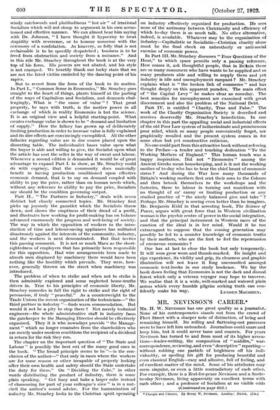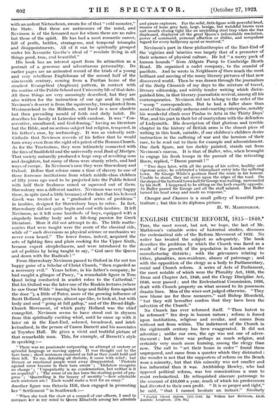MR. NEVINSON'S CAREER.*
Ma. H. W. NEVINSON has one great quality as a journalist.; None of his contemporaries stands out from the crowd of Fleet Street with a sharper note of distinction, of being and remaining himself. Its rolling and flattening-out processes seem to have left him untouched. Journalism could snare and keep him, but it could never tame and coarsen. For years Nevinson has turned to and from most of its higher avoca- tions—leader-writing, the composition of " middles," war- correspondence, reviewing, and even" descriptive" reporting— without rubbing one particle of brightness off his indi- viduality, or spoiling his gift for producing beautiful and even classical English—easy and allusive, full of feeling, and of excellent matter of the mind. Some of his attributes may seem singular, or even a little contradictory of each other. For example, there is a Zeal-for-peace Nevinson and a Smite- to-slay Nevinson, living apparently on excellent terms with each other ; and a professor of Socialism at no visible odds
(Continued on page 602.)
• Changes and Chancey. By Henry W. Nevinson. London ; Nisbet, [16s.1
with an ardent Nietzschea.n, sworn foe of that " cold monster," the State. But these are antinomies of the mind, and Ncvinson is of the favoured race for whom there are no rules but those of the spirit. He has had a most romantic career, full of perils, battles, stratagems, and .temporal triumphs and disappointments. All of it can be spiritually grouped under his favourite Goethe's ideal of " resolute living in all things good, true, and beautiful."
His book has an interest apart from its attraction as a
portrait of a generous and adventurous personality. Its earlier pages are an animated record of the trials of a young and very rebellious Englishman of the second half of the nineteenth century, coming from a Puritan home of the straitest Evangelical (Anglican) pattern, in contact with the routine of the Public School and University life of that date. All these things are very amusingly described, but they are also written for the instruction of our age and its youth. Nevinson's descent is from the squirearchy, transplanted from Westmoreland to the Midlands, and fixed in a now obsolete but then prevailing mould of faith and daily habit. He describes his family at Leicester with candour. It was " Con- servative, uncultured, and God-fearing," having no literature but the Bible, and no serious subject but religion, tempered, in his father's case, by archaeology. It was so violently anti- Catholic that Nevinson records of his father that he would turn away even from the sight of a priest of the Roman Church. As for the Tractarians, they were intimately connected with the fires of Smithfield and the universally read Book of Martyrs. That society naturally produced a large crop of revolting sons and daughters, but many of them were sturdy rebels, and had ways of escape. In Nevinson's case they were Shrewsbury and Oxford. Before that release came a time of slavery to one of those fearsome institutions from which middle-class children of fifty years ago used to be projected into the Public School with half their freshness caned or squeezed out of them. Shrewsbury was a different matter. Nevinson was very happy there, in spite (and a little because) of the fact that his beloved Greek was treated as a " graduated series of problems " in iambics, designed for Shrewsbury boys to solve. In fact, Shrewsbury did not quite begin and end with iambics. It left Nevinson, as it left some hundreds of boys, equipped with a
singularly healthy body and a life-long passion for Greek literature. More it did not attempt to do. The little mathe- matics that were taught were the scorn of the classical side, while of " such diversions as physical science or mechanics we never even heard." The lower forms, indeed, acquired the arts of lighting fires and plain cooking for the Upper Sixth, became expert steeplechasers, and were introduced to the art of politics by being taught to say, " God save the Queen and down with the Radicals ! " • From Shrewsbury Nevinson passed to Oxford in the not too happy guise of a Scholar of Christ Church, "then regarded as a necessary evil." Years before, in his father's company, he had caught a glimpse of Pusey, " a remarkable figure in Tom Quad being conducted- in scarlet- robes to the Cathedral." But his Oxford was the later one of the Ruskin lectures (where he saw Oscar Wilde " leaning his large and flabby form against the door "), a little of Pater, more of the growing influence of Scott Holland, grotesque, almost ape-like, to look at, but with body and soul " going at full gallop," and of the Broad-High- Church Movement, of which party Holland was the chief evangelist. Nevinson seems to have stood out in shyness from this spiritually exciting whirl, until he came up with it later on in the East-End, sobered, broadened; and intel- lectualized, in the person of Canon Barnett and his associates at Toynbee Hall. He gives a vivid and truthful picture of that remarkable man. This, for example, of Barnett's style in speaking :-
" There was no passionate outpouring, no attempt at oratory or splendid language or moving appeal. It was thought out to the bare bone ; short sentences crammed as full as they could hold and then left. To me, detesting all rhetoric, it came with relief ; but literary or emotional people went away disappointed. Protests against error become in their turn errors' ; Idolators recognize no change ' ; ' Unpopularity is no condemnation,-but neither is it an acquittal' ; The sense of sin has been the starting-point of pro- gress ; ' Quarrelling is the luxury of security'—how admirable such sentences are 1 Each would make a text for an essay."
Another figure was Octavia Hill, then engaged in promoting her " Settlement " in Southwark :— " When she took the chair at a council of our officers, I used to compare ker in my mind to Queen -Elizabeth--among her admirals
and pirate explorers. For the solid, little figure with powerful head, masses of loose grey hair, large, benign, but watchful brown eyes and mouth closing tight like an unyielding steel trap when she was displeased, displayed all the great Queen's indomitable resolution, power of command, personal affection or dislike, and scrupulous regard for every halfpenny spent or received."
Nevinson's part in these' philanthropies of the East-End of the 'eighties and 'nineties was largely that of a promoter of their schemes of physical culture. He led " a merry pack of
human hounds " from Aldgate Pump to Cambridge Heath Road. He organized a cadet company, to the scandal of pacifists. And he wrote in Neighbours of Ours much the most brilliant and moving of the many literary pictures of that new discovered world. Then he was drawn through the journalism of the Daily Chronicle of my days to the mixture of travel, literary editorship, and wittily tender writing which distin-
guished him, in that literary-journalistic revival, among all his contemporaries. Nevinson did not belong to the order of the " scoop " correspondents. But he had a fuller share than most of them of really arduous and exacting enterprise, notably his wonderful climb over Pindus to Arta in the Thirty Days' War, and his part in their lot of martyrdom with the defenders of Ladysmith. His description of that glorious and terrible chapter in- the history of British arms is the closest piece of writing in this book, suitable, if our children's children desire instruction in the suffering of war and the heroism of their race, to be read out to them for example and admonishment.
One dark figure, not too darkly painted, stands out from Nevinson's canvas. It is that of Buller, who, when besought to engage his fresh troops in the pursuit of the retreating Boers, replied, " Damn pursuit ! "
" Two days later, with all the pomp of his active, healthy and vigorous army, he celebrated a triumphant entry into the suffering town. Sir George White's garrison lined the route in his honour. Unable to stand, they sat down upon the edges of the road. On the steps of the battered town hall Sir George was waiting, surrounded by his staff. I happened to be sitting on the kerb exactly opposite. As Buller passed Sir George and all the staff saluted. But Buller turned his head away and made no response."
Changes and Chances is a small gallery of beautiful por- traiture ; but this is its diploma picture.
H. W. MASSINGI1A31.















































 Previous page
Previous page